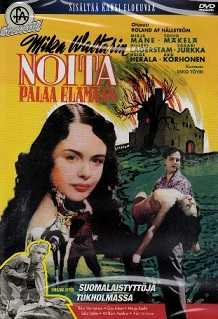Noita palaa elämään
| Noita palaa elämään | |
|---|---|
 | |
| Directed by | Roland af Hällström |
| Produced by | Mauno Mäkelä |
| Written by |
Viljo Hela Kaarlo Nuorvala |
| Based on | Mika Waltari's play Noita palaa elämään |
| Starring | |
| Music by | Tapio Ilomäki |
| Cinematography | Esko Töyri |
| Editing by |
Tapio Ilomäki Nils Holm |
| Studio | Fennada-Filmi |
| Release dates |
|
| Running time | 80 minutes |
| Country | Finland |
| Language | Finnish |
Noita palaa elämään is a Finnish horror film from 1952. It was directed by Roland af Hällstrom and produced by Mauno Mäkelä. The film is based on Mika Waltari's 1947 play of the same name.[1]
Controversy
The film is considered to be one of the first Finnish horror movies, along with Linnaisten vihreä kamari (1945) and Valkoinen peura (1952).[2] The nudity scenes provoked a stir at the time, and helped the film to get sold to the United States and the West Germany. In Finland, 14 meters of the film was censored, including the line: "I want to hold a young warm body in my arms – in the meadow, among flowers naked, in the warmth of fire, in the warmth of blood".[3]
Reception
Noita palaa elämään won two Jussi Awards, one for Esko Töyri for best cinematography and another for Lauri Elo for best production design. Young actress Mirja Mane was both praised and criticized for her performance as the witch. The reception from female critics was mostly negative, while some of the male critics noted that Mane's performance reflected an obvious talent.[4][5]
Cast
- Mirja Mane – Birgit Suomaa, the witch
- Toivo Mäkelä – Hannu
- Hillevi Lagerstam – Greta
- Sakari Jurkka – Veikko Hallberg
- Helge Herala – Kauko
- Aku Korhonen – Baron Hallberg
- Rakel Laakso – housekeeper
- Elna Hellman – Sauna-Maija
- Elsa Turakainen – Leena
- Elli Ylimaa – Saara
- Einari Ketola – Janne
- Jalmari Parikka – Henrik
- Mauri Jaakkola – chaplain
- Leo Jokela – hired man
References
- ↑ "ELONET – Noita palaa elämään – Tekijätiedot". KAVA. Retrieved 29 January 2013.
- ↑ "Suomalaisen elokuvan festivaali – Noita palaa elämään". Suomalaisen elokuvan festivaali. Retrieved 29 January 2013.
- ↑ "Waltari valkokankaalla: Noita palaa elämään". Lasipalatsin mediakeskus. Retrieved 29 January 2013.
- ↑ "ELONET – Noita palaa elämään – Sisältötiedot". KAVA. Retrieved 29 January 2013.
- ↑ Rajala, Panu (1998). Noita palaa näyttämölle. Mika Waltari parrasvaloissa. Porvoo: WSOY. pp. 186–188. ISBN 951-0-23014-6.